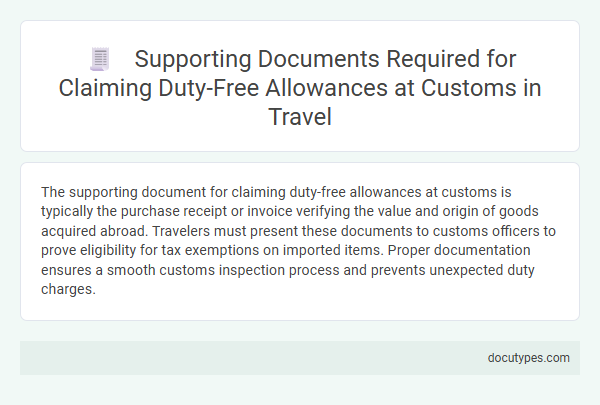The supporting document for claiming duty-free allowances at customs is typically the purchase receipt or invoice verifying the value and origin of goods acquired abroad. Travelers must present these documents to customs officers to prove eligibility for tax exemptions on imported items. Proper documentation ensures a smooth customs inspection process and prevents unexpected duty charges.
Overview of Duty-Free Allowance Policies
Duty-free allowance policies regulate the quantity and value of goods travelers can bring into a country without paying customs duties. These policies aim to simplify travel and encourage tourism by exempting certain goods from taxes.
Supporting documents for claiming duty-free allowances typically include passports, travel itineraries, and receipts for purchased goods. Customs officers use these documents to verify the traveler's eligibility and the value of duty-free items.
Essential Travel Documents for Customs Clearance
What is the supporting document for claiming duty-free allowances at customs? Customs officers require a valid passport and proof of purchase to verify your eligibility for duty-free allowances. Receipts, boarding passes, and any declaration forms must be presented to ensure smooth customs clearance.
Valid Passport and Visa Requirements
When claiming duty-free allowances at customs, presenting valid supporting documents is essential. Among these, a valid passport and visa meeting the destination country's requirements are crucial for approval.
- Valid Passport - A current passport with an expiration date beyond the travel period verifies identity and citizenship.
- Visa Requirements - Appropriate visas must be obtained based on the traveler's nationality and destination country rules.
- Entry and Exit Stamps - Customs officials often check stamps in the passport to confirm travel history and eligibility for duty-free claims.
Failure to provide these documents may result in denial of duty-free allowances at customs checkpoints.
Purchase Receipts and Invoices
Purchase receipts and invoices serve as essential supporting documents when claiming duty-free allowances at customs. These documents provide proof of purchase, detailing the item description, price, and date of acquisition. Customs officials rely on these records to verify the value and legitimacy of goods brought into the country within the allowable limits.
Boarding Pass as Proof of Travel
When claiming duty-free allowances at customs, providing a valid supporting document is essential to prove your eligibility. A boarding pass serves as a key proof of travel, demonstrating your recent departure from an international destination.
- Proof of International Travel - The boarding pass confirms your air travel itinerary and validates your eligibility for duty-free purchases.
- Entry and Exit Verification - Customs officials use the boarding pass to verify your entry and exit dates, ensuring compliance with duty-free regulations.
- Required Document for Claim - Presenting the boarding pass is typically mandatory to support your claim and avoid delays during customs processing.
Declaration Forms for Duty-Free Goods
Declaration forms for duty-free goods are essential supporting documents when claiming duty-free allowances at customs. These forms detail the items purchased, their value, and confirm eligibility for exemption from taxes or duties. Presenting accurate and completed declaration forms ensures a smooth customs clearance process and helps avoid penalties or delays.
Import Permits for Restricted Items
Import permits are essential supporting documents when claiming duty-free allowances for restricted items at customs. These permits verify that the restricted goods comply with import regulations and are legally allowed entry.
Customs authorities require valid import permits to process duty-free claims smoothly and avoid penalties or confiscation. Ensure you obtain the correct permits before arrival to facilitate a hassle-free customs clearance experience.
Currency Declaration Documentation
When claiming duty-free allowances at customs, providing the correct supporting documents is essential. Currency declaration documentation often serves as proof of your financial transactions and adherence to customs regulations.
- Currency Declaration Form - A mandatory document that details the amount of currency you are carrying into or out of a country.
- Receipts and Invoices - Proof of purchase for goods declared, supporting your claim for duty-free allowances.
- Customs Declaration Receipt - An official record confirming that your currency declaration has been reviewed and accepted by customs authorities.
Special Documentation for High-Value Items
Supporting documents for claiming duty-free allowances at customs vary depending on the type and value of the items being declared. High-value items require special documentation to verify their authenticity and value.
Receipts, invoices, or certificates of authenticity are essential for high-value items such as luxury watches, jewelry, and electronics. Customs authorities may also require appraisals or proof of purchase from authorized dealers. Proper documentation ensures smooth processing and prevents delays or disputes during customs clearance.
What Is the Supporting Document for Claiming Duty-Free Allowances at Customs? Infographic

